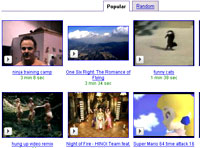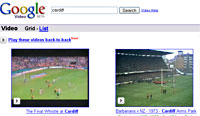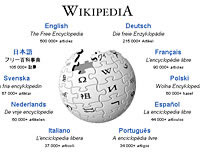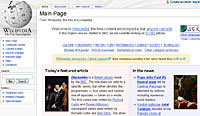 Slapping iTunes around the face with their hefty gauntlet, Google have laid down a challenge to iTunes with the announcement of their new video and television Internet service, the Google Video Store.
Slapping iTunes around the face with their hefty gauntlet, Google have laid down a challenge to iTunes with the announcement of their new video and television Internet service, the Google Video Store.
Announced by Google Co-founder and President Larry Page at the closing keynote address of the International Consumer Electronics Show in Las Vegas, the service will let consumers to buy and rent a wide range of video content from major TV networks, cable programmers, independent producers and film makers.
The rapidly growing catalogue will also include current and archive material from CBS, NBA, music videos from SONY BMG and news and historical content from ITN.
 The service promises to “democratise” video sales, letting wannabe Spielbergs sell their movies on Google Video Store, with Google taking what Larry Page has described as a “very low” percentage of the sale cost.
The service promises to “democratise” video sales, letting wannabe Spielbergs sell their movies on Google Video Store, with Google taking what Larry Page has described as a “very low” percentage of the sale cost.
“Google video will let you watch lots of high quality video on the Web for the first time. You can search and browse, and we make it fast and easy for you to watch,” enthused Page.
“For video producers and anyone with a video camera, Google Video will give you a platform to publish to the entire Google audience in a fast, free and seamless way,” he added.
 Visitors to the Google Video homepage at video.google.com will be able to shuffle through what’s on offer by searching listings by category or by text search.
Visitors to the Google Video homepage at video.google.com will be able to shuffle through what’s on offer by searching listings by category or by text search.
Content from Google Video can be viewed on Google’s video player, a free download that includes a “thumbnail” navigation feature that enables users to browse through an entire video, or frames at a time, with a click of their mouse.
iPod and Sony Playstation Portable users will also be able to download and watch specially optimised versions of non-copy-protected content from Google Video.
Google Video Store will shortly be available throughout the world, although premium content will only be available for purchase in the US.
 Blinkx have unveiled blinx.tv To Go, a new service that helps users track down online video content and then lets them upload it to their iPod or personal video player.
Blinkx have unveiled blinx.tv To Go, a new service that helps users track down online video content and then lets them upload it to their iPod or personal video player. Visitors searching the company’s database of video blogs and podcasts are able to either save the video to their player with a single click, or save the search to a channel which automatically feeds updated video content to their player, where it can be viewed as a single media stream.
Visitors searching the company’s database of video blogs and podcasts are able to either save the video to their player with a single click, or save the search to a channel which automatically feeds updated video content to their player, where it can be viewed as a single media stream. “Our vision of IPTV combines the interactive, customisable experience of the Internet, with the simple, seamless way we watch TV, and now we’ve made it portable,” Chandratillake added.
“Our vision of IPTV combines the interactive, customisable experience of the Internet, with the simple, seamless way we watch TV, and now we’ve made it portable,” Chandratillake added. Keen to get their size nines stamped all over the fast-growing podcasting revolution, Yahoo have launched a spanking new podcast service designed to make it easy for punters to rummage through the zillions of audio files available and find the stuff that interest them.
Keen to get their size nines stamped all over the fast-growing podcasting revolution, Yahoo have launched a spanking new podcast service designed to make it easy for punters to rummage through the zillions of audio files available and find the stuff that interest them. Surfers will also be able to listen to or subscribe to RSS (Really Simple Syndication) feeds for individual shows, episodes or entire series.
Surfers will also be able to listen to or subscribe to RSS (Really Simple Syndication) feeds for individual shows, episodes or entire series. The service will offer a unique feature that lets users find content quicker by speeding up playback without the the broadcaster’s voice sounding like Mickey Mouse on helium.
The service will offer a unique feature that lets users find content quicker by speeding up playback without the the broadcaster’s voice sounding like Mickey Mouse on helium. Unlike rival Podcast search sites, Yahoo! isn’t bundling in tools for creating podcasts at the moment, although that’s likely to happen in the future, with Joe Hayashi, Yahoo!’s director of product management saying, “This is all about discovery for now. Step One is all about growing the ecosystem.
Unlike rival Podcast search sites, Yahoo! isn’t bundling in tools for creating podcasts at the moment, although that’s likely to happen in the future, with Joe Hayashi, Yahoo!’s director of product management saying, “This is all about discovery for now. Step One is all about growing the ecosystem. Champagne corks were firing off at Google like a military salute as the Internet search engine kings revealed that their profits had jumped more than 300 per cent in the second quarter this year.
Champagne corks were firing off at Google like a military salute as the Internet search engine kings revealed that their profits had jumped more than 300 per cent in the second quarter this year. The company’s fortunes are currently on a stratospheric trajectory, with April’s first-quarter profit almost six times higher than a year earlier.
The company’s fortunes are currently on a stratospheric trajectory, with April’s first-quarter profit almost six times higher than a year earlier. Yahoo has announced plans to ramp up the feature set of its
Yahoo has announced plans to ramp up the feature set of its  The service currently only allows users to include content from other Yahoo services such as Yahoo Photos and Yahoo Music, but now Yahoo are to offer the inclusion of RSS (Really Simple Syndication) feeds from other sources.
The service currently only allows users to include content from other Yahoo services such as Yahoo Photos and Yahoo Music, but now Yahoo are to offer the inclusion of RSS (Really Simple Syndication) feeds from other sources. Champagne corks were popping like manic machine gun fire at Google yesterday as the company reported a thumping fivefold increase in profits in the first quarter.
Champagne corks were popping like manic machine gun fire at Google yesterday as the company reported a thumping fivefold increase in profits in the first quarter. Revenues generated from Google’s partner sites through its AdSense programs generated $584 million, or 47 percent of revenues, – a hefty 75 percent increase over partner-related revenues a year ago.
Revenues generated from Google’s partner sites through its AdSense programs generated $584 million, or 47 percent of revenues, – a hefty 75 percent increase over partner-related revenues a year ago. Google has started dishing out factual answers for some queries at the top of its results page, thus sparing click-weary users the hassle of navigating to other sites to look up the information.
Google has started dishing out factual answers for some queries at the top of its results page, thus sparing click-weary users the hassle of navigating to other sites to look up the information. Norvig went on to explain that Google feeds the service with information from Web sites they considers to be reliable, but it’s yet to establish formal relationships with any of the sites providing the content.
Norvig went on to explain that Google feeds the service with information from Web sites they considers to be reliable, but it’s yet to establish formal relationships with any of the sites providing the content. Yahoo’s search engine division has announced that it will be dishing out hardware galore, resources and “critical material aid” to support the non-profit Wikipedia online encyclopedia.
Yahoo’s search engine division has announced that it will be dishing out hardware galore, resources and “critical material aid” to support the non-profit Wikipedia online encyclopedia. “Their popularity is growing very fast and, accordingly, their bandwidth and hardware needs have increased substantially.”
“Their popularity is growing very fast and, accordingly, their bandwidth and hardware needs have increased substantially.” A US appeals panel has challenged new federal rules which require certain video devices to incorporate technology designed to prevent copying digital television programs and distributing them over the Internet.
A US appeals panel has challenged new federal rules which require certain video devices to incorporate technology designed to prevent copying digital television programs and distributing them over the Internet. Google has added another product to its long list of extended beta services.
Google has added another product to its long list of extended beta services.